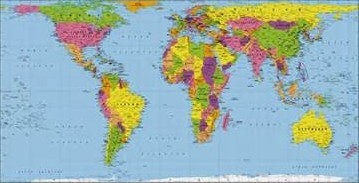Where are you, God?
QUOFLECTIONS™
ON SPIRITUALITY AND ETHICS
“I just don’t understand
the will of God.”
Anonymous woman,
regarding a tragic death
In the aftermath of 90,000 square miles of devastation along the Gulf Coast, how can we believe in a loving God? Is God dead? Impotent? The Cosmic Sadist?
Questions like these arise for some disaster victims overcome with grief. The anguish could be due to traumatic losses from Hurricane Katrina, the South Asia tsunami, 9/11 or any of the billions of personal tragedies on our planet. In all these events, we cannot dismiss the emotional turmoil that prompts the angry question, “Where are you, God?”
From a different perspective, many observers are tempted to blame the victims of tragedy: “They should have gotten out” is frequently said of those trapped in New Orleans. What may not cross our radar is that, as MSNBC reports, “nearly 30% of the people in New Orleans live below the poverty line…Some 134,000 couldn’t leave because they couldn’t afford transportation.”
One famished and traumatized woman is distraught because she lost everything. Even since her evacuation from New Orleans, she has had only one meal in two days. She keeps asking for help, she says, but no one will help her. Her savings account totals $8. One man amidst a large group stranded in New Orleans explains, “We live from paycheck to paycheck.”
The former interim president of Loyola University in New Orleans, Rev. William J. Byron, SJ, comments, “Only shame can accompany our growing awareness that those most heavily hit in New Orleans were poor, black people living on the margins in a city that for years has displayed characteristics of a Third World country.” He continues, “Too many white, rich, and powerful people have been content to do nothing about the situation, just to coexist for years with the poverty and racism in the city we like to call The Big Easy. Not so easy now.”
So where are you, God?
Ten days after his 24-year-old son dies in a tragic auto accident, Rev. William Sloane Coffin eulogizes Alex. He speaks of a woman who comments the day after Alex’s death, “I just don’t understand the will of God.” Coffin is incensed, “I’ll say you don’t, lady!”
Coffin comments, “God doesn’t go around this world with his fingers on triggers, his fists around knives, his hands on steering wheels. God is dead set against all unnatural deaths.” He concludes God’s heart is the first to break as God gives “minimum protection, maximum support.”
So why does God permit horrendous disasters? Coffin writes, “As all of us who strive to be good parents know, love is self-restricting when it comes to power.” Nevertheless, the message of Easter following Jesus’ crucifixion demonstrates the ultimate triumph of love over power: “Easter has less to do with one person’s escape from the grave than with the victory of seemingly powerless love over loveless power.”
If we human beings are the communal expression of God’s presence, then there is an answer to our question, “Where are you, God?” God is present in scores of Christian, Jewish and Muslim relief agencies. God is present in hundreds of houses of worship converted into emergency shelters. God is present in millions of believers and even non-believers who contribute acts of compassion and billions of dollars to relieve dire need.
No, the most pertinent question is not, “Where are you, God?” It is, “Where am I?” Am I blaming the victims, or assisting them? Am I content with widespread poverty and racist policies, or will I actively oppose these inhuman cruelties? Am I blaming God, or beckoning God to work through me?
Reverend Fleming Rutledge, an Episcopal priest, confronts us with a call to compassion: “May he move all of us affluent Christians who are sitting at our computers in our nice clean houses to open our minds, neighborhoods, pocketbooks, and hearts to the sufferers who have been swept up in a cataclysm less of their making than ours.”
God yearns to work through you and me. How will we respond?
©2005 Harry Rix. All rights reserved.
Related Articles
Glimpsing the Creator
What Wouldn’t Jesus Do?
How Do We Pursue Peace?
Transforming Our Way of Thinking
Does God Need Us?
Perceiving Good Amidst Evil Fosters Hope

